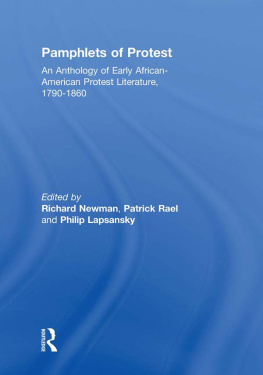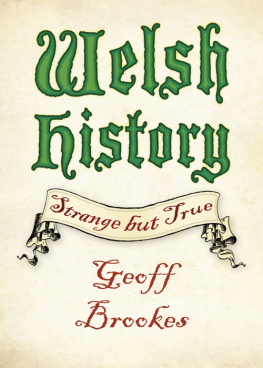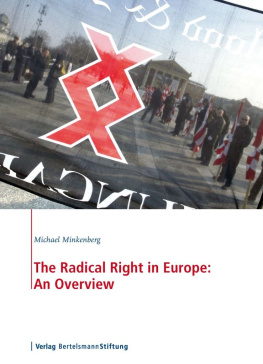Marion Lffler, 2014
All rights reserved. No part of this book may be reproduced in any material form (including photocopying or storing it in any medium by electronic means and whether or not transiently or incidentally to some other use of this publication) without the written permission of the copyright owner except in accordance with the provisions of the Copyright, Designs and Patents Act 1988. Applications for the copyright owners written permission to reproduce any part of this publication should be addressed to The University of Wales Press, 10 Columbus Walk, Brigantine Place, Cardiff CF10 4UP.
www.uwp.co.uk
British Library Cataloguing-in-Publication Data
A catalogue record for this book is available from the British Library.
ISBN 978-1-7831-6100-3
e-ISBN 978-1-78316-102-7
The right of Marion Lffler to be identified as author of this work has been asserted by her in accordance with sections 77, 78 and 79 of the Copyright, Designs and Patents Act 1988.
Cover illustration: H. White & Sons, Carmarthen (c.1865), from the Welsh Landscape Collection. Reproduced by kind permission of the National Library of Wales.
When twenty-six millions of men shook off the most galling and oppressive despotism, lovers of freedom, we felt joy at so many sons being born to her. Would not a good Christian, your Lordship for instance, rejoice, were he to hear, that the whole empire of China was converted to the Christian faith. Of a similar kind was our joy, on account of this event. Prizing liberty, when we saw its votaries increase, when we saw a nation of eminent influence, of general resort, accustomed to give the tone to the rest of Europe, a nation respectable for its science, its arts, its letters, its polished manners, declare decidedly in its favour, it was natural for us to feel heart-felt satisfaction.
[David Jones], The Welsh Freeholders Farewell Epistles to the Right Rev. Samuel Lord Bishop (Lately, of St. Davids) (London, 1794), pp. 389.
Publications against everything hitherto deemed sacred are circulated with an industry and assurance beyond the example of former times; and to promote their success, the titles, the size, and the style are artfully suited to readers of every description. With what avidity such writings are sought after what pernicious impressions they have made upon some weak minds, and still more upon ill disposed ones can hardly have escaped the notice of anyone who is attentive to what is passing.
Samuel Strong, A Sermon preached at the Ordinary Visitation of the Lord Bishop of Saint Asaph, at Wrexham (Wrexham, 1795), pp. 212.
WALES AND THE FRENCH REVOLUTION

The French Revolution of 1789 was perhaps the defining event of the Romantic period in Europe. It unsettled not only the ordering of society but language and thought itself: its effects were profoundly cultural, and they were long-lasting. The last twenty years have radically altered our understanding of the impact of the Revolution and its aftermath on British culture. In literature, as critical attention has shifted from a handful of major poets to the non-canonical edges, we can now see how the works of women writers, self-educated authors, radical pamphleteers, prophets and loyalist propagandists both shaped and were shaped by the language and ideas of the period. Yet surprising gaps remain, and even recent studies of the British reaction to the Revolution remain poorly informed about responses from the regions. In literary and historical discussions of the so-called four nations of Britain, Wales has been virtually invisible; many researchers working in this period are unaware of the kinds of sources available for comparative study.
The Wales and the French Revolution Series is the product of a four-year project funded by the AHRC and the University of Wales at the Centre for Advanced Welsh and Celtic Studies. It makes available a wide range of Welsh material from the decades spanning the Revolution and the subsequent wars with France. Each volume, edited by an expert in the field, presents a collection of texts (including, where relevant, translations) from a particular genre with a critical essay situating the material in its historical and literary context. A great deal of material is published here for the first time, and all kinds of genres are explored. From ballads and pamphlets to personal letters and prize-winning poems, essays, journals, sermons, songs and satires, the range of texts covered by this series is a stimulating reflection of the political and cultural complexity of the time. We hope these volumes will encourage scholars and students of Welsh history and literature to rediscover this fascinating period, and will offer ample comparative scope for those working further afield.
Mary-Ann Constantine and Dafydd Johnston
General Editors
Contents
SELECTION OF PAMPHLETS
1 [Morgan John Rhys], )
2 John Jones, Glan-y-Gors, Bardd, , [1795]))
3 J. Jones, Glan y Gors, )
4 Thomas Roberts, o Lwynrhudol, , [1798]))
5 [William Richards], )
Preface
The influence of the French Revolution manifested itself in different ways in the various parts of the British isles. In England and the Lowlands of Scotland it engendered the most fundamental debate about politics since the English civil war, according to John Barrell. In Ireland it fanned the flames of a struggle for independence inspired by both the American and the French republics. Wales did not experience political mass mobilization on anything approaching the same level and no propaganda in favour of Welsh independence emerged. Yet the French Revolution nevertheless furthered Welsh-language Enlightenment efforts and brought a nascent public debate cautiously sparked by the American War of Independence to first fruition. The main expressions of this process of cultural and political revolution, as originally noted in R. T. Jenkinss classic volume, Hanes Cymru yn y Bedwaredd Ganrif ar Bymtheg, were a new Welsh periodical literature, the recasting of the medieval eisteddfod as a modern institution with a democratic governing body in the gorsedd of the bards, and the public pamphlet wars conducted by Welsh radicals and loyalists, war-mongers and pacifists, Anglicans, Dissenters and Methodists.
Many of the English and some English-language Irish and Scottish pamphlets of this profoundly influential epoch in the political history of Europe have been made accessible in the eight volumes of Political Writings of the 1790s edited by Gregory Claeys. Yet, as he notes in brackets, Welsh developments remain more obscure. His only example of a radical Welsh pamphlet, provided in a footnote, is An Address to the Jacobine and Other Patriotic Societies of the French; Urging the Establishment of a Republican Form of Government by Richard Prices nephew George Cadogan Morgan, who spent all his adult life in England, signed A Native of England, and a Citizen of the World and did not address Welshmen. This neglect is partly due to the fact that, unlike any other region of the British isles at the time, much of the Welsh printed material was in the vernacular Welsh, and is therefore inaccessible to most English-speaking researchers. This volume thus fills a sizeable gap by considering the bilingual discussion conducted in Welsh political pamphlets and sermons published between 1790, when the first Welsh texts in response to the French Revolution appeared, and 1806, the end of the Methodist controversy. Its first part discusses the varied publications as they emerged in exchanges of letters and replies or accusations and vindications in the main categories of Religion, War and Peace, King and Crown, and the Legal Sphere. The second part of the volume features texts and translations of five radical Welsh-language pamphlets all of them important contributions to the intellectual and political history of Wales contextualizing them in the Welsh revolution debate. The five texts were chosen for two reasons. Firstly, unlike many other contemporary English-language and some loyalist Welsh-language publications, they are not currently available in digital form. Their reproduction with notes in this volume will therefore make the original texts more easily available and understandable to a new generation of Welsh scholars. Secondly, since none of them has appeared in English before, translating them will make them accessible to a non-Welsh speaking audience. Bethan Jenkins, Bodleian History Faculty Library, Oxford, is mostly responsible for the translation, a feat on which she is to be congratulated.








